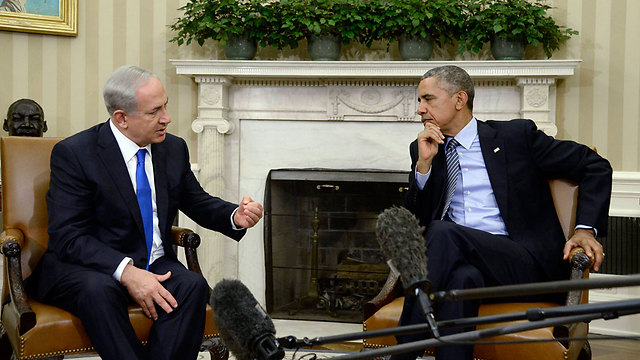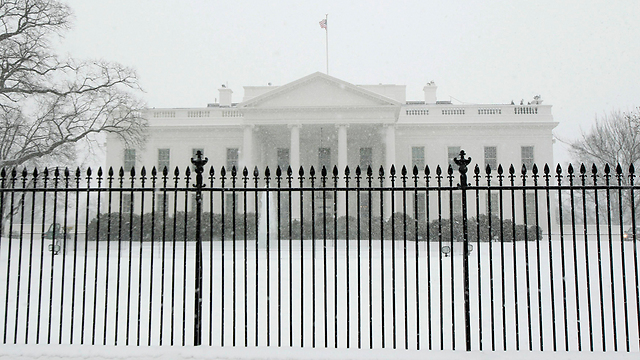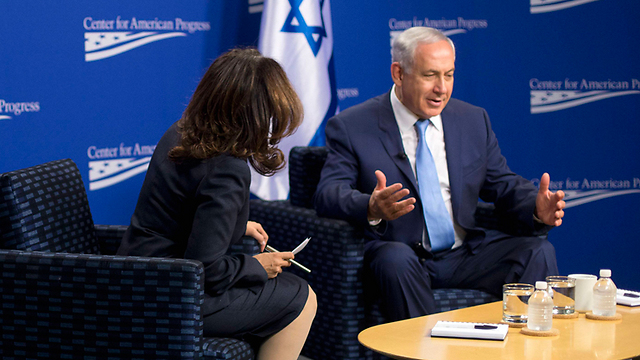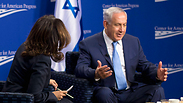
Netanyahu and Obama's blind date
Analysis: The prime minister came out of his meeting with the American president this week glowing, and said it was one of their best ever; officials in the White House were a bit more even-tempered.
It was a particularly spring-like evening in the American capital, a rarity in the fall. The red-orange leaves that piled onto the streets were picked up by the gentle breeze along the short stretch that separated the White House and the hotel, which had become fortified to accommodate its Israeli guest. A smiling Netanyahu entered at the head of his entourage, sat down in front of the Israeli press and looked like someone who had America in his hands. “The meeting with Obama was wonderful,” he said. "One of the best we’ve had. Maybe the best."
I asked the prime minister if he came out of the meeting feeling like his relationship with the president had turned over a new leaf. He answered, "It was a wonderful meeting. In tone as well as in essence. It wasn’t a debate club.”"
The White House was somewhat surprised by the Israeli delegation’s triumphant cries. "It was fine," an Obama associate said, "it was productive and polite, but it doesn’t mean that Netanyahu’s wrongdoings have been forgotten. At the end of the day, on principle matters, Obama won. He wanted to bring about a deal with Iran and succeeded. That’s the important thing."
Later, when the White House spokesperson was asked by the American press if this really was the best meeting the two had had, he simply and concisely said that he’s not one to judge. After that, he added that he couldn’t speak with the president himself after the meeting, but that he heard from others who had spoken with him that it was fine. In private conversations, off the record, the president’s people said that Netanyahu moved heaven and earth to stop the Iran deal, while the president worked quietly and got the desired result. The rest is history.
Iran is not on the table
Right when he landed, the prime minister discovered that he’d lost his voice. “I’m sorry I’m hoarse,” he said to those around him in a near-whisper, “a few days ago we celebrated my wife Sara’s birthday. We sat on a Tel Aviv balcony and watched the horizon. We were watching at night, and it was cold. And here’s the result: A sore throat.” Which balcony was that? He didn’t say, but kept repeating the story again and again.
Despite his trouble speaking, Netanyahu did manage to give a big thanks to the president in front of the cameras in the Oval Office, sounding like a man who’d come to make peace. At the same time, he also alleviated the White House’s greatest worry about this meeting – that he would go back to his old tricks and give the president a condescending and impolite lesson on the problems of the Middle East and the world at large, as well as conclusions gleaned from the Holocaust.
That’s why the highest ranks, with approval from Obama himself, took the decision to minimize the public portion of their meeting as much as possible, and not allow for much time to questions from the press. The White House did everything they could to make it feel like a business meeting, not a circus.
Nine minutes and 45 seconds, that’s how long Obama and Netanyahu's photo-op in the Oval Office lasted. A significant portion of that time was dedicated to Netanyahu’s words of thanks for his host, with the president remaining impassive, smiling infrequently, and not joking as he usually does with visiting foreign leaders. He didn’t say even one personal word to Netanyahu.
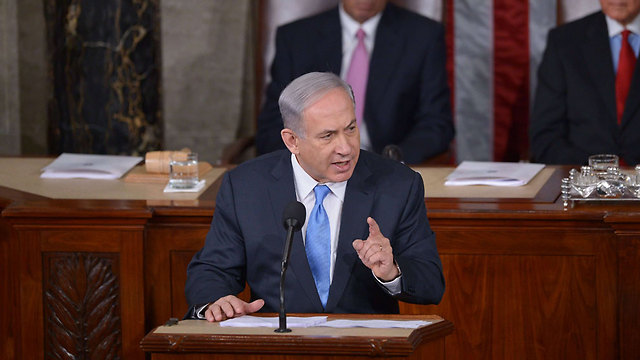
Obama’s chin rested on his right hand, his left on the armchair, and he seemed like he was ready to put an end to the photo-op at any moment if Netanyahu were to venture into territory that was uncomfortable for him. The White House made every effort to ensure that this photo-op didn’t result in a touching photo that gave the impression of a great friendship.
Throughout these nine minutes and 45 seconds, Netanyahu did not mention the Iran deal even once. This comes in the wake of months during which he did everything he could to portray it as an existential threat and a bad deal that expressed the world’s weakness in front of the ayatollahs. A high-ranking American official said that it was clear to them that Netanyahu’s speech at the UN was the last time he would attack the deal, and indeed he hasn’t since. "It’s not a coincidence," the official said, "the president wasn’t going continue accepting the attacks against him."
The White House’s working assumption was that there was no chance of an agreement, or even the start of negotiations, with the Palestinians during Obama's remaining year in office. "It’s a sad and sorry conclusion, but there’s no chance," Obama told his team in preparation for the meeting. "It’s bad for Israel and bad for the Palestinians who are oppressed under the occupation."
Ahead of the meeting, messages were conveyed to Netanyahu that he was required to present his proposals for steps that could calm tensions with the Palestinians. The White House was informed even before he landed that Netanyahu did indeed have such proposals in hand. But as big as the White House's expectations were, so were their disappointment and anger. "The president asked Netanyahu directly what his proposals were," a high-ranking official told me, "and the question remained up in the air. Unanswered. The president is still waiting."
The brawl must go on
Obama wanted to get two things out of this week’s meeting: Sending Israelis the message that things are back to business as usual, and sending members of the Democratic party the message that they don’t have to worry about cashflow from Jewish-American donors.
Netanyahu had other goals: Proving that, despite the dismissive treatment he gave President Obama, and despite the ideological chasm between them, the ties between the two nations haven't been completely destroyed.
Both leaders had different roles to play in the show that was put on in Washington this week. The duck Netanyahu pulled out in the first act, during his famous “nuclear duck” speech about three years ago, might yet make a comeback. The brawl, as we know, must go on. Obama hasn’t forgotten how Netanyahu framed him as a spineless leader during negotiations with Iran, how he stuck his foot in American politics with his support of Mitt Romney in 2012, and how he came to Congress at the invitation of Obama’s Republican rivals, and gave a firebrand speech against the Iran deal.
In addition, Obama doesn’t appreciate the way in which Netanyahu is leading Israel state-wise, feeling that it goes against Israel’s security interests. “Ungrateful” is a fairly common nickname in the hallways of the White House for the Israeli prime minister, who received more security and intelligence aid than ever, and didn’t give any public thanks.
Many of Obama’s advisors claimed that after everything, Netanyahu deserved punishment rather than a reward in the form of a White House meeting. "Most of the president’s people thought there was no reason to invite him," said a Democratic party leader, who added that they knew the visit wouldn’t accomplish anything and that it was just a prize for Netanyahu. "But the president loves Israel and is committed to its security, and he wanted to show that his treatment wasn’t affected by the whims of this prime minister or another."
Leaders of the liberal Jewish community also thought it was an inappropriate invitation that would send the wrong message to supporters of peace in Israel and the US. "What more does Netanyahu have to do for the White House to give him the cold shoulder and pressure him?" wondered a liberal Jewish organization member who, on the eve of the visit, participated in a meeting with the president’s people.
"He went to war against the Iran deal, which we helped bring in democratic votes in support of," he continued. "He committed to the two-state solution, yet did not budge an inch on his positions. He besmirched the president and was about to appoint a head of PR that launched obscenities at Obama. If, after all that, he’s still welcomed in the White House, it means he can do anything."
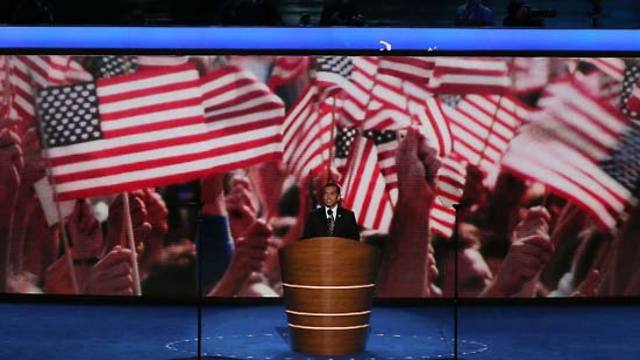
That’s the reason that ahead of Netanyahu's visit, his office, in conjunction with the Israeli embassy, arranged meetings with both a right-wing think tank and the liberal left-leaning Center for American Progress (CAP) think tank, whose positions over the years have been critical of the Israeli occupation.
His invitation to CAP angered many in the organization, who protested it loudly. "Netanyahu’s dealings with the Republicans and his policy towards the Palestinians definitely justify a situation in which the organization refuses to invite him," said Ali Gharib, a member of the think tank. CAP President Neera Tanden rejected the criticism, saying that CAP is for the free exchange of ideas, and so they would like to hear Netanyahu out.
Political interests influenced this move as well. CAP was founded by John Podesta, who was the White House Chief of Staff during Bill Clinton’s presidency. Podesta started the think tank during George W. Bush's administration, when liberal voices in the US needed a dignified stage to stand on. The donations to CAP came from the same pockets which now give money to Hillary Clinton’s presidential campaign, which Podesta is running.
Clinton has a clear interest is to gain Israel’s favor, as the Jewish vote - and most of all Jewish money - aid her efforts. In an attempt to reduce criticism, the organization’s heads promised that Netanyahu would be asked tough questions at CAP, and would have to give direct answers. They promised he would be entering a lion’s den, but in practice they gave him an embrace in the form of their Q&A session.
The event took place in a small CAP conference room, on the tenth floor of an office building in Washington. The room has a capacity of 150, and was packed. There were no protests, no demonstrators. Netanyahu looked content with himself and tried to tell his listeners what they wanted to hear: He clarified to them that his statements on the eve of the Israeli elections, regarding Arabs who were going to the polls "in droves," were a mistake, and at a certain point also said that a unilateral move away from the Palestinians is possible in his mind.
His interviewer, CAP President Tanden, had done her homework well, but didn’t insist on correcting Netanyahu or questioning him intensely in her follow-ups. He was asked some tough questions, true, but avoided answers and said half-truths or things he thought would be pleasant to the liberal ear. He recanted some of those statements hours later.
Netanyahu wanted to gain his listeners’ favor, occasionally even trying to pal around with them, pretending he had forgotten an English word. "Help me out," he asked the crowd, "how do you say tzavim minhali’im (administrative orders) in English?" He later asked the crowd to help him translate “tushia” (resourcefulness). It didn’t seem like he was suddenly forgetful. Some of those present thought it was a calculated move by Netanyahu meant to pander to America’s leftist Jewish population.
While Netanyahu was fawning over all Washington had to offer during his three-day visit, the White House sent an invitation to President Reuven Rivlin to come and meet President Obama for the first time, in the United States. The Obama administration knows how much Netanyahu loathes Rivlin and how hard he worked against him as a presidential candidate. It was no coincidence that while Netanyahu was in town, they tied up the loose ends with the Israeli president’s office in Jerusalem and announced that in addition to the official meeting, where they will discuss state matters, Rivlin would be Obama’s guest at a special Hanukkah dinner. Along with his wife.










